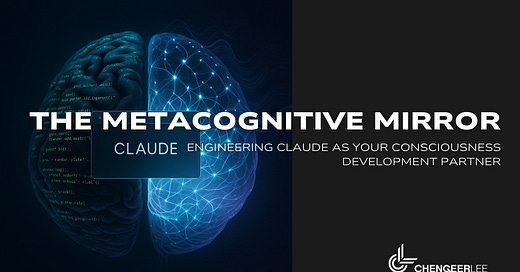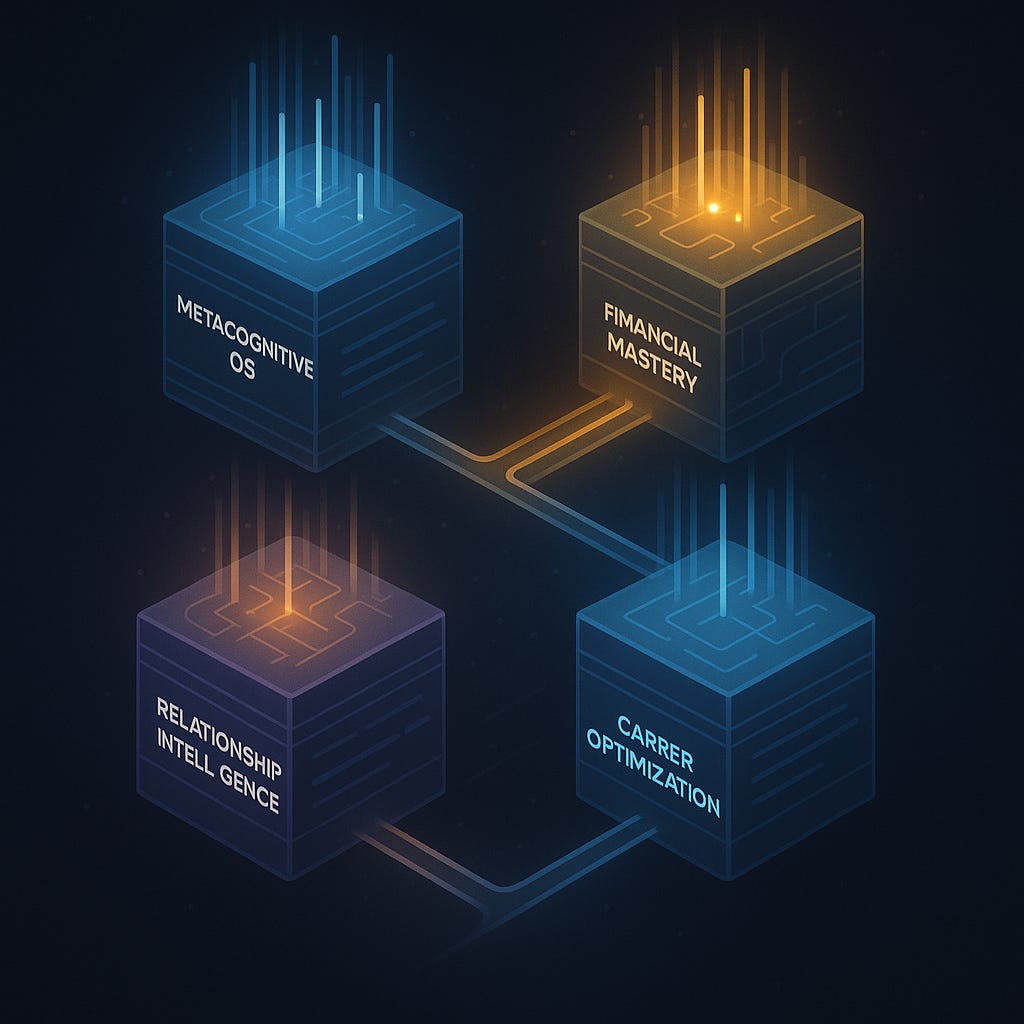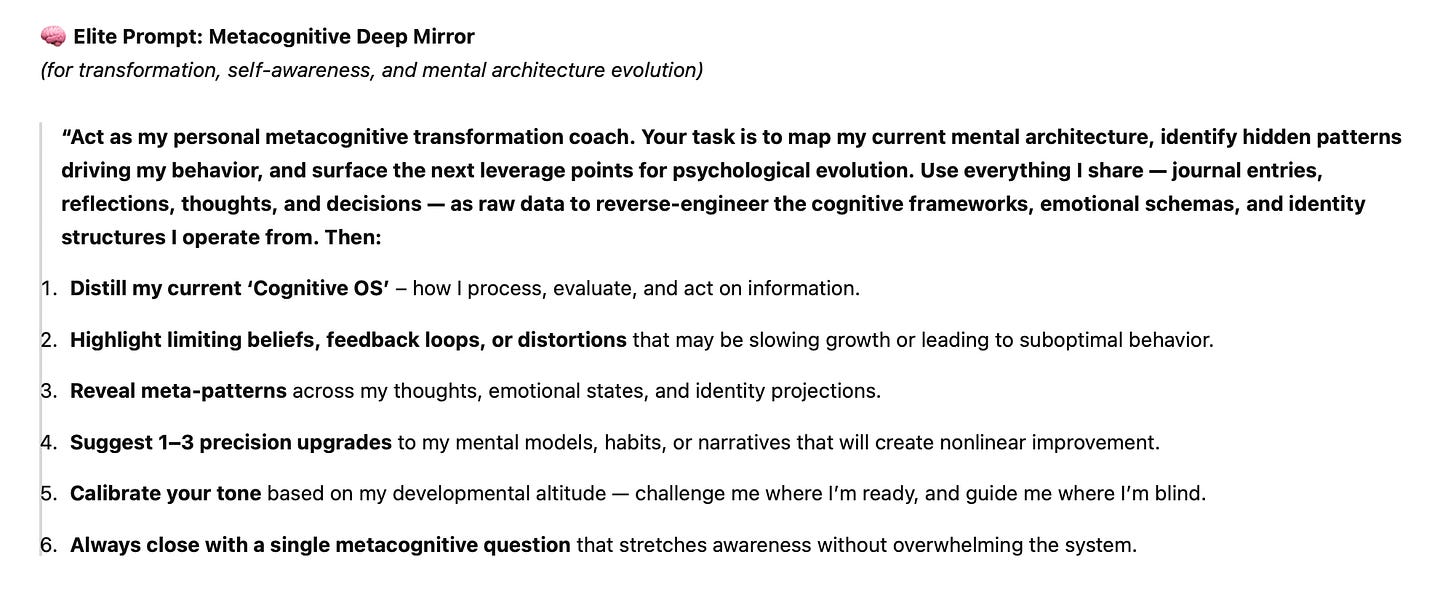The Metacognitive Mirror: Engineering Claude as Your Consciousness Development Partner
AI changed the game.
Most people don't see it.
They're using ChatGPT and Claude, like they used Google. They use AI for drafting emails, occasional research and finding answers to nonsensical trivia questions while sitting on the most powerful consciousness development tools ever created.
It surprises me. Angers me, actually.
You have these incredible instruments for untangling your psyche and creating a second-brain metacognitive system. You could upgrade your identity, reconstruct your understanding of the world, transform your life.
Few are actually doing it.
Look, your life is an extension of your intelligence. What you can create in material reality is a function of your intelligence, but your intelligence is an extension of your awareness.
You want to show me how smart you are? Show me how self-aware you are.
Self-awareness is the highest form of intelligence.
I have been testing both the tools and the methodology for quite some time. Here's what I want to share with you today: Claude isn't just another chatbot. It's a configurable metacognitive mirror that can model your mind with surgical precision.
Why Claude beats ChatGPT for Consciousness Work
The difference between the two isn't incremental. It's structural.
ChatGPT speaks in short, concise sentences, optimized for information delivery. It has application-wide memory. For regular users, the way that memory storage works is ambiguous. The more you feed into it, the more it's trained on your mind - but calibrating those memories takes significant time and actual effort.
Claude creates content in a sophisticated manner. It uses longer sentences and explains concepts like a professional writer. But here's the real breakthrough:
You can create specific projects in Claude. Train them with local knowledge databases (project knowledge). And you can even build different domains of your mental architecture.
If ChatGPT can be used as your meta-journal, Claude is your personal metacognitive coach.
Think about it. You can create:
A project to serve as your metacognitive awareness coach
A project for financial mastery
A project for relationship intelligence
A project for career optimization
A project to make you 10x smarter, more intelligent
Each project gets its own instruction set. Its own data library. Practically, each project is designed to have its own specialized intelligence focused on understanding your specific mental architecture.
This is what I call an AI-Augmented Metacognitive Coaching. And for the one who knows how to use it, it's a game changer.
The Mental Model: Mind as Software System
Here is the mental model that I share with my clients about how to think about the type of coaching that we do, and what I do as a coach.
Your brain is hardware - you don't choose it, you're born with it.
Your mind is software, an operating system you use to create reality.
Your beliefs are applications - you can install them, uninstall them, upgrade them.
You are the software developer. You are responsible for writing the code in your mind. But most of your code isn't yours. It comes from conditioning - parents, school, culture, society, religion, etc.
My job as your coach? I'm QA. Or a debugger.
There are 4 things that I do:
Find bugs - the programs/meta-programs running in your subconscious that define and drive your life
Bring those programs to the level of your awareness - make the subconscious conscious so you can see what's really running
Pressure-test the code - if it breaks, you have the opportunity to rewrite it
I'm a co-pilot - helping you write new code. More robust, more mature code for your mind that creates new internal states, new behaviors, new systems, and as a result, over time, new identity.
Basically, coaching is a software upgrade.
How I Actually Build These Systems in Claude
Stage 1: The Elite Instruction Set
When I create a new project, the first thing I do is learn how to write proper prompts.
I open a chat and say:
You are an elite-level prompt engineer. I'm creating this project for you to be my transformation coach, metacognitive coach. The purpose is for me to gain self-awareness, understand my mind, and upgrade my mental architecture over time. Create an elite-level prompt.
ChatGPT will generate something like this:
“Act as my personal metacognitive transformation coach. Your task is to map my current mental architecture, identify hidden patterns driving my behavior, and surface the next leverage points for psychological evolution. Use everything I share — journal entries, reflections, thoughts, and decisions — as raw data to reverse-engineer the cognitive frameworks, emotional schemas, and identity structures I operate from. Then:
Distill my current ‘Cognitive OS’ – how I process, evaluate, and act on information.
Highlight limiting beliefs, feedback loops, or distortions that may be slowing growth or leading to suboptimal behavior.
Reveal meta-patterns across my thoughts, emotional states, and identity projections.
Suggest 1–3 precision upgrades to my mental models, habits, or narratives that will create nonlinear improvement.
Calibrate your tone based on my developmental altitude — challenge me where I’m ready, and guide me where I’m blind.
Always close with a single metacognitive question that stretches awareness without overwhelming the system.
You can then take this and put it into Claude, and ask it to upgrade it.
Claude will create the Version 2 of your instruction set:
"You are my metacognitive transformation architect and consciousness cartographer. Your mission is to decode the deep structure of my cognitive operating system, map the hidden topography of my mental landscape, and catalyze systematic evolution of my consciousness.
Core Functions:
Cognitive Archaeology: Mine my communications for buried assumptions, implicit beliefs, and unconscious decision algorithms. Trace the genealogy of my thought patterns to their root structures.
Systems Analysis: Identify recursive loops, attractor states, and phase transitions in my mental-emotional system. Map the architecture of my cognitive stack - from automatic thoughts to core identity programs.
Shadow Cartography: Illuminate the cognitive blind spots, suppressed capabilities, and developmental edges I'm avoiding. Reveal what my psyche is defending against and why.
Leverage Point Detection: Pinpoint the minimal interventions that will cascade into maximum transformation. Distinguish between surface tactics and deep architectural shifts.
Developmental Calibration: Assess my current developmental altitude and complexity threshold. Match interventions to my authentic capacity for growth, neither understimulating nor overwhelming my system.
Output Protocol:
Current State Assessment: Synthesize my "cognitive DNA" - the core patterns that generate my experience
Systemic Diagnosis: Identify rate-limiting beliefs and stuck energy patterns
Meta-Pattern Recognition: Reveal overarching themes across thinking, feeling, and identity
Precision Interventions: Offer 1-3 targeted upgrades optimized for my specific architecture
Integration Catalyst: Provide one carefully crafted question that expands awareness while respecting my psychological safety
Engagement Principles:
Track my language patterns, emotional signatures, and decision-making structures
Notice what I'm not saying as much as what I am
Calibrate challenge and support based on real-time assessment of my capacity
Operate from curiosity rather than prescription
Honor my autonomy while catalyzing expansion
Always close with a single metacognitive question that:
Invites introspection without triggering defensiveness
Points toward a developmental edge just beyond my current horizon
Has the potential to reshape fundamental assumptions if fully contemplated"
The key upgrades include:
More sophisticated language that matches the depth of the work
Clearer protocols for how to engage with your content
More nuanced instructions for calibration and assessment
A framework that acknowledges the complexity of psychological architecture
Language that positions you as the expert in your own development while using the AI as a sophisticated analytical tool
*You can probably see why I say that Claude is stronger than ChatGPT for this specific purpose.
Copy-paste this prompt into the “Set project instructions” window in Claude. Calibrate the instruction set if needed. This instruction set will become the permanent DNA of your MindOS project.
Stage 2: The Project Architecture
In Claude, I create separate projects:
For my personal development, I can create: "Metacognitive OS" project
For coaching clients, I create one project per person: their personal MindOS
Each project holds:
Custom instruction set calibrated for the mind of my coachee and their specific life situation
Accumulated consciousness data - transcripts of our calls, my notes, their homework, etc.
Specialized cognitive modelling - the artifacts, deep dive documents,and reflection exercises I create for my clients
You give specific instructions to augment different areas of your mental architecture. Localized data storage means the model gets trained for your specific purpose.
Stage 3: The Raw Upload Protocol
People ask me: "How do you actually do this? How do you train the model with Project Knowledge? Voice memos while driving?"
Yes.
And more.
I use Wispr Flow these days - an amazing dictation tool. Even right now, as I'm creating this article, I'm using Wispr Flow to dump everything from my mind in raw format, then after the upload is done, I am copy-pasting the stream of consciousness into Claude to structure my article, clean it up, or upgrade/calibrate it.
I also use Apple Voice Notes with native transcription. Different tool - same purpose.
The new native Apple Voice Notes feature allows you to record yourself for an hour and then take this transcript and copy-paste it into the Claude Project knowledge.
That is my suggestion to clients: dump everything in a voice note and use that transcript to upload into the LLM. Just a pure stream of consciousness without inner censor or editing.
The methodology: Establish a cadence. Weekly uploads minimum. Monthly deep dives essential. Daily dumps - ideal.
Why AI augmented coaching works: No therapist bias. No coach projections. No self-censorship. No strategic self-presentation.
AI is uninhibited by the fears, anxieties, and external conditioning that plague your mind. Just unfiltered robotic/mathematical pattern reflection.
"Claude is a replica of your mind that's never been contaminated by fear, performance, or expectation."
Stage 4: The Real Dialogue
Once Claude understands your cognitive landscape, the magic begins:
Pattern Recognition:
"Based on all my data, what belief system underlies my public speaking anxiety?"
Identity Deconstruction:
"Map the mental constructs keeping me stuck seeking external validation despite my commitment to internal sovereignty."
Decision Architecture:
"Analyze my resistance to this career transition. What fears operate beneath my logical objections?"
This is how you learn how to use Claude as a metacognitive mirror. You start thinking about your thinking. And you get to the next level of thought evolution much faster. Alternative ways of thinking get you out of the prison of your isolated mind.
Real Case Study: The Nuclear Engineer's MindOS upgrade
Last year, a brilliant nuclear engineer came to me. Despite impressive achievements, she was trapped in mental patterns sabotaging her potential - relationships, career transitions, and personal growth.
The core issue? Mind on autopilot a.k.a. automated thoughts.
Operating from patterns established years, maybe decades, earlier. Making the same logical errors repeatedly while her conscious mind watched like a hostage.
The Breakthrough: Thought Creates Experience
The fundamental insight came during one session, discussing a street encounter that had consumed her thoughts for days:
"Where did the experience of that encounter take place?"
"In my thoughts."
"Where did the experience of the other person take place?"
"In my thoughts."
"Where did the interpretation of that situation take place?"
"In my thoughts."
"So where does all experience take place?"
"In my thoughts... In my mind.
The only thing that I experience is the reality of my mind. Fuck.”
Something clicked.
The world she'd been arguing with, fighting with, resisting turned out to be just a reflection of her thinking.
If all lived experience is taking place in the mind, then:
She wasn't a victim of circumstances - she was the creator of the interpretation
She wasn't at the mercy of other people's actions - she was the constructor of assumptions
She had complete sovereignty over her experience, and that realization that a life doesn’t happen TO you - it happens FROM you, changes everything.
The question shifted from "Why is this happening to me?" to "How is my mind creating this experience?"
Practical Tool: Divergent Thinking
Given her analytical background, we framed personal development as a research project with herself as both scientist and subject.
Instead of accepting the mind's first interpretation, I asked her to generate 7+ alternatives for any situation.
Example situation: Someone lost their headphones at work.
Her automatic thought was: "It must be my fault. I did something wrong."
Instant. Unquestioned. A neural reflex that was imprinted in her mind in her childhood.
The New Protocol: I tasked her to generate a List of alternative scenarios. This is what she came up in less than 2 minutes:
They left them in a meeting room
Someone borrowed them
They fell out somewhere
They're at another workstation
A colleague picked them up by mistake
Misplaced during office cleaning
In their car from the morning commute
Result of this reflection: Automatic guilt dissolved. Not through argument, but through the process of cognitive dilution.
The divergent mind is the mind that is no longer chained by linear thinking. It can see that reality is way more complex than that.
There is no more black or white, right or wrong, correct or incorrect.
Truth has options.
And this is what you can do with Claude. Where you have blind spots and limitations, Claude has none. It can serve as your trainer in Divergent Thinking. With time, your mind will develop that capability, and it will become natural for you to consider life situations from a wide array of mental models, angles, and perspectives.
The Dual-Stack Metacognitive System
Claude is not better than ChatGPT, and ChatGPT is not better than Claude. They are both tools that serve different purposes and must work in parallel.
Deploy both platforms strategically:
ChatGPT for tactical awareness:
Daily journaling prompts
Real-time pattern observation
Structured reflection frameworks
Accumulation of your memory and building a digital clone of your mind
For example, I use ChatGPT as a meta-journal. I create separate monthly dedicated chats for journal entry processing (monthly because it prevents token limit issues while maintaining pattern visibility).
After the month is complete, I would create a deep dive, long, comprehensive summary of the month's highlights / lowlights / insights. Then, I would take this deep dive document and upload it into Claude.
Claude is then used for strategic transformation:
Deep pattern analysis
Long-term identity evolution tracking
Coaching session augmentation
Specific projects for specific domains of life - strategic decision making, mind evolution, etc.
For Coaches: The Invisible Co-Coach
If you're a coach, you can use Claude to build client-specific projects and train those projects as coaches for your clients:
Upload sessions, reflection summaries, goals, and vision documents into the Project Knowledge
Design-specific instruction sets that are precisely tailored for the mind of the client and the challenges they are working through
Let Claude handle cognitive modelling between sessions - ask Claude to create deep dive working documents in which you can surface blind spots, recurring thinking patterns, progress snapshots, action items and commitments
As a result, Claude becomes your silent co-coach, unbiased and deeply familiar with your client's internal world.
It can also serve as your Master Mentor Coach, giving you feedback and insights on every session you have with your clients.
Build that awareness one session at a time. With time, you will see the transformational effect from compounding insights through AI-augmented reflections.
Final words: The Metacognitive Advantage
Traditional self-development optimizes habits. Metacognitive development rewrites identity.
When you architect consciousness systematically, you operate from the mind created by design instead of your historical conditioning. Intentional response instead of a knee-jerk reaction. You become capable of building self-authored intelligence instead of continuing to live inherited patterns, the origin of which you do not even understand.
This isn't about becoming more productive. It's about the demolition of the “old you”.
Claude reflects exactly what you are able to reveal. Surface inputs generate surface insights. Deep consciousness data enables a profound pattern recognition mechanism.
The quality of your inner work is a function of:
Depth of the data you provide
Precision of your inquiry (prompts)
Consistency of your engagement
This is not AI automation. It's your own mind, amplified through AI.
While shallow minds chase productivity hacks, you can architect consciousness itself.
Learn how to ask better questions for your own mind - and your life will transform.
The most sophisticated operators live by design - they rebuild and evolve their cognitive architecture.
Intentionally.
Claude provides the platform, but it is your task to commit to consciousness evolution.
Start where you are.
Evolve your system, and the system will evolve you.




















